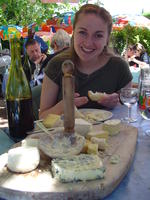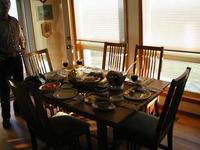

I made the mistake of assuming that my manners would come with me across the pond as naturally as my southern accent did. The years of my mother’s training in the home were followed by etiquette classes in college, and I felt quite at ease in a formal dining environment. Then I moved to France.
Our first dinner with a French family was a truly wonderful experience. I remember I was taking a delicious bite of foie gras when my husband leaned over and said in a gentle voice, “Keep your hands on the table.” I had obviously misunderstood, so I smiled and leaned over to ask him, “What did you say?” He quietly, but firmly responded with, “Keep your hands the table!” Surely I had not heard him correctly, as any well-brought up young lady knows that you do not rest your hands on the table while eating. As I was thinking it over, he turned to me and calmly said, “Keep. Your. Hands. On. The. Table.”

At this point, I surrendered my badge of southern belle training and trusted my husband’s knowledge of French etiquette. I lifted my hands from their place in my lap to rest gently on the table. And then I looked around to realize that everyone else at the table was already doing just that.
As expatriates, we all have these experiences in which we see so clearly that our culture does not translate well into French. The rules are different, and in order to thrive in our new country, we must adapt to this new way of doing things. But first, we must learn what exactly these rules are. Let’s play a game of true and false.
You should place your napkin in your lap immediately after being seated.
False. Once the lady of the house places her napkin in her lap, other guests should follow suit.
Your bread should go in the upper left edge of your plate.
False. Bread is placed directly on the tablecloth, unless it is a formal meal in which bread plates are used.
When the aperitif is served, you wait for the host to give the toast before drinking.
True. You should wait for the host to lead the way, whether an aperitif or dinner course. Once everyone has been served a drink, the host will generally make a short toast after which the glass-clinking begins. It is polite to make eye contact as you say, “Santé.”
You should tear your bread into a bite-sized piece before eating it.
True. It is very impolite to take a bite from the whole piece of bread.
If someone asks you to pass the salt, you pass both the salt and pepper.
False. In the U.S., the salt and pepper are “married,” meaning they should always stay together on the table. In France if you are asked for the salt, you simply pass the salt.
After each course, you should wipe your plate with a piece of bread.

True. However, this should be done gently as a means of cleaning the plate for the next course, not slopping up the leftover sauce. In a more formal setting, each course is served on a new plate, so cleaning the plate is not necessary.
Wine glasses should be filled up to five millimeters from the brim.
False. When pouring wine, stop when the glass is three-fourths full.
When invited for apéros, you should bring a gift for the hostess.
False. For apéros, no gift is necessary. If you invited for dinner, you should bring a gift for the hostess. Good ideas are flowers, a good bottle of wine, or a pre-agreed dessert or cheese dish.
A French dinner often consists of a salad with vinaigrette for the starter, main course, cheese course, dessert, and coffee.
True. Bread, wine, and mineral water are offered throughout the meal.
It is acceptable to eat
pommes frites with your fingers.
False. While fast food has made its mark in France, eating foods with your fingers is still strictly limited when you are at the dinner table. If in doubt, follow the lead of your host.
--------------------------------------------------------------------------------------

By Kari Masson, a freelance writer for travel, cross-cultural, and expatriate-focused publications. More than 50 of her articles have appeared in North America, Europe, and Africa. If you are looking to add dynamic creativity to your publication, contact Kari at
www.jkmassonprint.blogspot.com